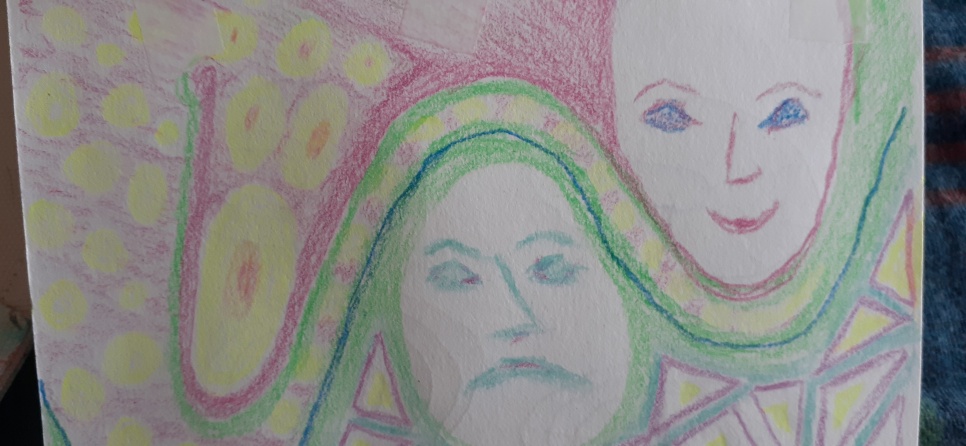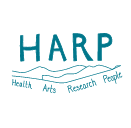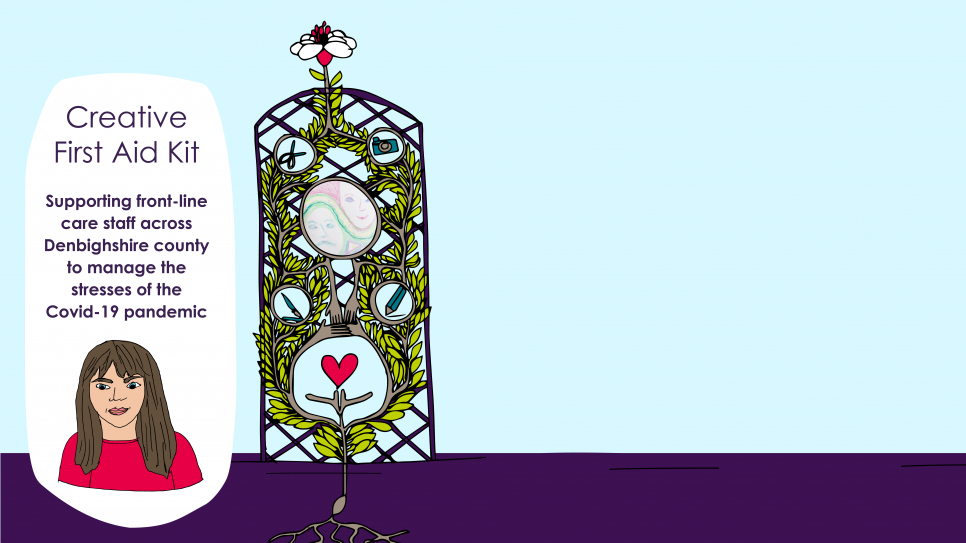Kevin Jarvis, of Denbighshire County Council, Sian Fitzgerald of Denbighshire Leisure, and artists Mari Gwent and Steffan Donnelly, reflect on supporting frontline care staff across Denbighshire county to manage the stresses of the COVID-19 pandemic…

Frontline health and social care staff in Denbighshire faced unprecedented challenges as a result of the COVID-19 pandemic.
Outbreaks of the virus in care homes, and other social care settings, caused deaths at an unthinkable scale, placing a huge psychological toll on staff. Many health and social care staff also found themselves trying to fill the social and emotional gap left when family visits to care homes and hospitals were suspended.
The capacity of health and social care staff was also stretched as many fell ill or had to isolate because of COVID-19.
We sought to co-produce a sustainable and innovative arts resource for frontline care staff that brought creativity and positivity to their daily routines.
Recognising that self-care becomes secondary when responding to emergency needs, we hoped to co-create a resource that resonated with frontline staff, gave them a much-needed wellbeing boost, and helped them feel valued.
We wanted to gain valuable learning that we could then feed into the development of a staff wellbeing resource for internal and external frontline care and support staff, in Denbighshire and beyond.
[As care staff], we are taught to care, to be sociable and compassionate. [Now during COVID-19] we are being asked to close a door on someone reliant on you, knowing they won't see anyone else, they are in distress and frightened, and we cannot even hold their hand to offer comfort. The burden of responsibility for protecting life is all-consuming
Understanding the care settings
The artists, Steffan and Mari, visited care homes in Denbighshire. They chatted with staff there, as well as with care home managers and community support services staff.
Those few hours of conversation provided insight into the reality of working in care homes during the pandemic.
It was a privilege to visit the homes and learn from the care workers about their emotional experiences. I learned new ways to collaborate and develop creative ideas through digital platforms meetings
It inspired us to develop a creative health and wellbeing ‘first aid’ kit for staff. Packages were sent to 10 volunteers containing a handmade "two-door concertina book", which they could use as a notepad or sketch pad; a canvas pencil wrap; colouring pencils; and other useful items. Twice a week, Mari emailed a creative task to participating staff, such as photographing something in their garden or drawing the shadows a particular object makes. The aim was to create moments of mindfulness and focus for the participants in their everyday environments.
We chose these activities specifically to encourage care staff to use creativity to reconnect with themselves and others, to make sense of the care environment, and to help them deal with feelings of stress or frustration.
What we learned
The process taught us a great deal.
It was a privilege to visit the homes and learn from the care workers about their emotional experiences. As artists, we learned new ways to collaborate and develop creative ideas through digital platforms meetings.
The care staff who participated in the creative first aid kit exercises reported feeling more positive as a result. It was a shame that the virtual nature of the project, dictated by COVID-19 restrictions at the time, prevented the participants from engaging directly with the artist setting the tasks, as they reported that they would have liked a social element to the project with more direct contact with the artists. This suggests that in times of stress or challenge, peer support during a creative activity is equally as important as the creative activity itself.
Overall, feedback was also challenging to capture, as evaluation surveys were often not returned and baseline data was mixed. This is perhaps because many care staff do not use emails or video calls in their day-to-day work, so this presents barriers to engaging with them, especially during COVID-19 restrictions. It was clear to us that measuring the impact of a wellbeing project requires a creative and engaging data collection process that is built into its lifespan.
Caring for care staff into the future
The wellbeing agenda and creativity of this project struck a chord with staff working in other areas of the service, who expressed interest in participating. We hope that given the early promise and positive feedback, the Council may consider developing the artist’s tasks to create a more permanent staff wellbeing resource.
Building on feedback from participants, we also recently held a 'wellbeing away day' for social care staff at the Ruthin Craft Centre, allowing us to explore the potential of engaging care staff in creative wellbeing exercises face to face.
The day was well received and inspired us to continue finding new ways to support the well-being of our Council’s social care workforce.
‘Creative first aid kit’ was a HARP-supported Seed partnership between Denbighshire Leisure, Denbighshire County Council, and freelance artists Steffan Donnelly and Mari Gwent.

